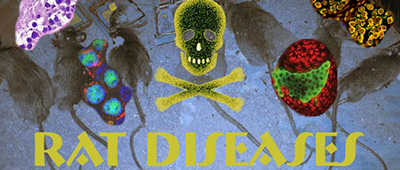People like to think that rats are impervious to pain, but organisations such as PETA have shown that this is simply not the case. With over 100 million rats being used and killed in experiments and toxicology tests in the US alone, it's no wonder that more research is being done into the effects we might be having on these creatures.

Rats have also been shown to have empathy for each other, and more than that, sympathy too. Rats will throw themselves in the line of fire to protect another rat, something else that has been seen in scientific studies, and much more besides. To say that they have quite a few similarities to humans, and the way that humans live their lives, would be an understatement.
In the US, these laboratory bred rats and mice are not covered by the same guidelines that would govern animals such as cats and dogs, thus not eliminating them from beauty experiments and various other animal-testing roles. It is not even required by law to give these rodents any anaesthetic before horrific and painful injuries and conditions are inflicted upon them. That's quite horrific when you consider that these animals are not impervious to pain as we are led to believed. They actually feel pain, in almost every sense of the word, in basically the same way as we humans do.
Go back to the Rats in the Attic home page.
Do rodents like rats feel pain?

A homeowner’s first instinct upon finding a rat is to regard it with utter horror and dismay. Seeing a rat, either in your garden or, worse, inside your house is bound to bring you pain and misery as you battle the soon-to-be infestation for control. But does it work the other way around?
It is well known that rats are used in a number of laboratory tests, and animal rights groups regularly condone any testing on creatures due to the physical and emotional pain it puts them through. Although we may treat them with disgust, rats are, like any other creature, certainly capable of feeling pain.
For starters, rats, like all mammals, have a sensory and nervous system not too dissimilar to our own. This means that they will undoubtedly feel physical pain via their nerves, or react to any outward stimulus. But their ability to feel pain goes far beyond the realm of the physical. Much like humans, they have consistently shown signs of being able to feel emotional pain as well.
Studies on rats have shown that they react positively to being tickled or stroked, analyzing their facial expressions for markers of happiness or pleasure. For example, when happy, rats have shown to relax their ears.
Similar studies have revealed a wide array of negative emotional responses, both to physical and mental trauma. In a similar pattern to humans, rats will narrow or close their eyes when faced with something painful and will curl their ears backward. This has led scientists to develop a “grimace scale” especially for rats to measure and record pain levels.
Initially, scientists thought these were purely physiological; in other words, automatic physical reactions that had no other meaning. But further studies have shown that rats can respond to emotional trauma and even display signs of empathy by being able to read signs of distress in other rats, and possibly even humans.
For example, caged rats in laboratories will purposefully lick the wounds of other rats to ease the pain, or else mimic their injuries via a psychological phenomenon called “emotional contagion”. In another study, two rats were placed in a cage to become familiar with each other, after which one was placed in a clear container inside the cage with a door. Sounds of a rat in distressed were played to the rat in the cage, and the research found that in most cases the caged rat would actively learn to open the door of the container to free its caged mate.
This experiment was repeated multiple times, which showed that the rats were not just opening the container door out of curiosity but out of genuine motivation to help the other rat after developing a bond. This demonstrated that rats were also able to feel emotional pain and display empathy, as well as feeling physical pain.








